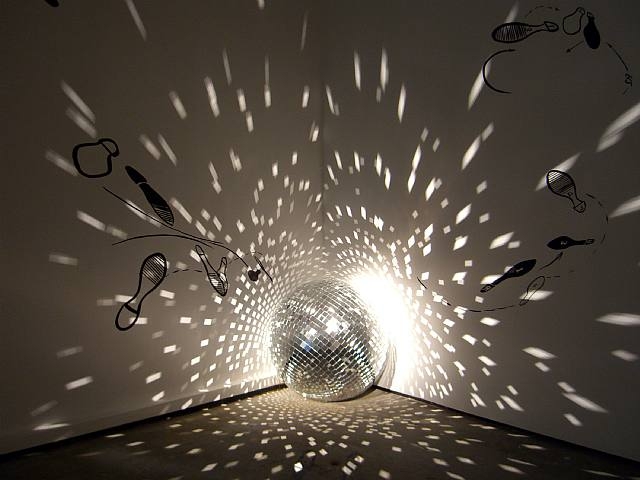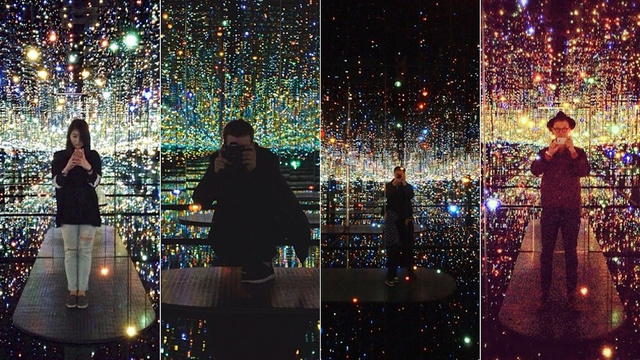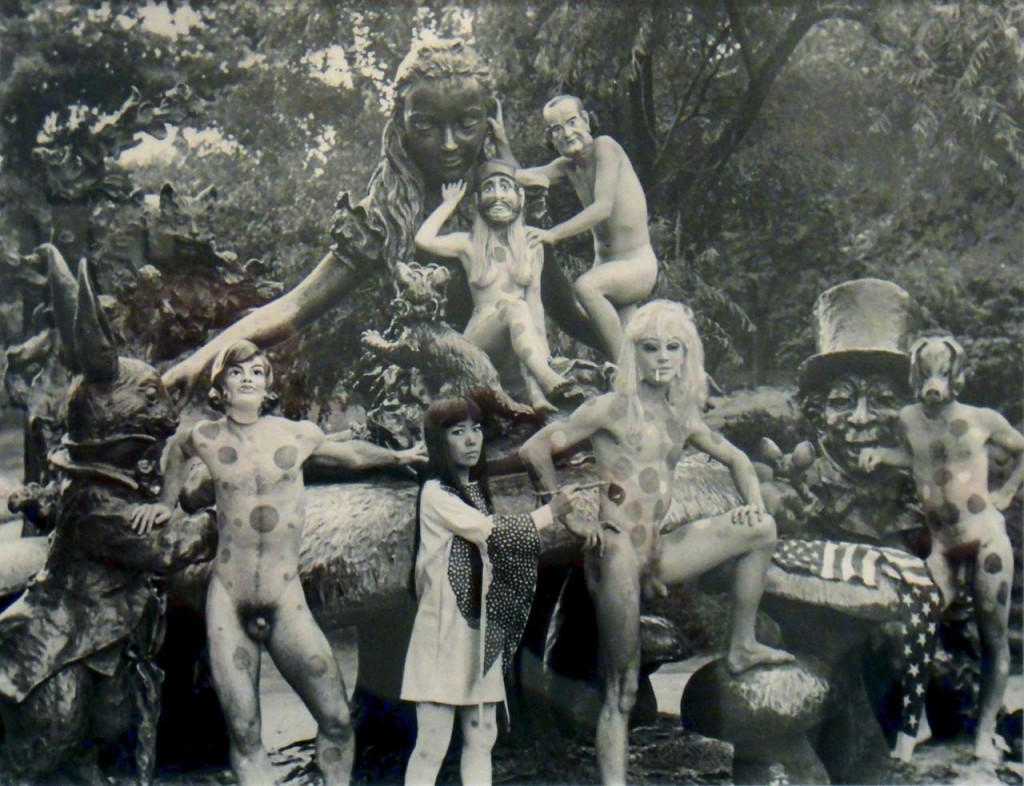Reflections on Reflecting
|
In celebration of our 10th issue, Reclaim Media, some Reflections on Reflecting:  Titian, Venus with a Mirror, c. 1555 Titian, Venus with a Mirror, c. 1555
1. Venus with a Mirror Sometimes I literally catch myself gazing at my navel – which I have long thought of as the site where all my skin meets and thus that of my potential unraveling. Fascinating in its physicality, frighteningly a lint trap, mesmerizing as a metaphor – I can’t help but stare. As an artist, I am constantly reminded of how repulsive navel gazing can be. I spend most of my time seeking out spaces that discourage this type of reflection. When I realize I am navel gazing – in the bath, a moment of solitude, the throws of writer’s block, self-reflection quickly transforms into self-scrutiny. I begin making laundry lists of other things I should be thinking about: saving the whales, nuclear disaster, gun control. I rattle off my concerns like adding another political button to my jacket, each topic feeling more and more like a prop in self-styling as the list goes on. I confidently believe in the importance of self-work, self-love and selfies. I depend upon these activities to recharge with the hopes of harnessing restored energy towards something bigger than myself. However, now that the spectacularization of self is practically a job requirement and increasingly central to how we socialize, it seems crucial to interrogate what idea of the self is reflected back when we look at ourselves. In that spirit, to celebrate the 10th issue and second anniversary of RECAPS, I want to engage in a bit of meta navel gazing to highlight possible meanings for self-reflection from our archive. I take great measure to situate my political perspectives in my own experiences. Like catching a glimpse of yourself in the rearview mirror, this type of self-reflection reveals the context we move through and the danger of our blind spots. In my first letter from the editor I frame RECAPS in my personal desire for community. In narrating aspects of both college and graduate school experiences, I was attempting to signal to the limits of writing within an academic context. Sometimes in embarrassing detail. Since the first issue, there has been a surge of new social movements that de-emphasize the role of the individual. In my most recent editorial statement, I found myself betraying my deep-seated second-wave feminist tendencies by claiming that personal has in fact become too political. The archive RECAPS has accumulated reflects these movements and some of the strategies they have employed to favor the anonymous and the collective. We Are All Pussy Riot. Masks to confront surveillance. Personas to play with public spheres. Simultaneously, there have been efforts to highlight individuals within the context of statistics and social crises . Returning to the self to reignite community. Thinking about radical narcissism. Researching one’s own archive of feeling. What is to be done? Do not despair. The challenge is not to erase the self, but rather to expand how we look at it. Can I enact solidarity with the whales I wish to help as I soak in Epson salts and stare at my tummy? This is both a practical and poetic conundrum for which I continue to look for concrete solutions. Fortunately, Annie Sprinkle and Beth Stephen’s provide some useful ideas for solidarity practices in their Ecosexual Ephemera included in this issue. Together we can think of practices for self-indulgence and self-reflection that are sustainable. 2. Discoball Worlds and Other Reflections on Space The intersecting histories of art and the performance of the everyday (or every night as often is the case) are loaded with radical possibilities for how mirrors can change space. There is potential for dramatically changing an environment by merely reflecting it back to itself. Feminist artists have used this as tool, from Claude Cahun to Francesca Woodman, Maya Dern to Joan Jonas, among many others. Joan Jonas, Mirror performance III, 1969Unexpected reflections that catch us off guard make the policing of identity visible in new ways. The internal alienation produced by marginalization becomes visible. Altering space through reflection can highlight or obscure desires, both of which can make space for new types of liberatory performance. Consider how space is queered by the chaos cast by the spinning of a disco ball. From the handheld mirror at a consciousness-raising circle to the reflective interior of a boite de nuit, mirrors create new kinds of social spaces with revolutionary potential.  Sanford Biggers, Calenda (Big Ass Bang!), 2004 Sanford Biggers, Calenda (Big Ass Bang!), 2004
Moving through a landscape is almost synonymous with reflection. But contemplation and wandering in unfamiliar terrain have become tethered to the architecture of social media and fogged by new levels of hyper-mediation and ubiquitous surveillance. These restraints on reflecting recall the responses to one of my favorite fantasy landscapes, Yayoi Kusama’s Fireflies on Water and her larger body of work known as Infinity Rooms. How does a singular figure navigate an exponentially multiplying fantasy landscape, a forest of fairy lights, a sea of dots?  Image from Gizmodo. Image from Gizmodo.
Apparently by taking a selfie. It’s not enough to look at oneself in the reflecting pool unless it is uploadable. The proliferation of selfies that Kusama’s Infinity Rooms have inspired (which explicitly prohibit photography) point to questions of how technology changes the relationship of the figure to the ground, mediation changes meditation, compulsive documentation changes ephemeral experimentation. There is no prior state of being in space we ought to idealize, nor does the desire to document seem like one to fight. How then can reflection alter the relationship between virtual and physical space? The possibilities of mirroring physical and virtual space onto each other are addressed with reverberating gusto in this issue. Amelia Acker asks us what the mobile gaze reveals about the surveillance of gender performance. Kellie Lanham takes up Victoria Fu’s figure of a woman with a mirror in The Milk of the Eye to address the history of analog technology within the cultural landscape of the digital age. Miyuki Baker’s images from a series of queer travel zines reflect possibilities for decolonizing travel writing. We mirror our visions of space to each other, the reflections bouncing off each other with kaleidoscopic glee. 3.Reflections on the Remix  Kristyna Milde, čUMENI Kristyna Milde, čUMENI
When I reflect it is often because I want to know something better, to hold and caresses the contours of a moment, feeling, idea or thing. Reflecting inevitably alters the subject. The mirror image reverses the form, making the site of inquiry all the more elusive. Alteration and alienation produces an un-knowing, a defamilarization that complicates something as quotidian and intimately understood as one’s own face. I think of the impulse to remix, re-record, or retrace, similarly as an attempt to know something better that ultimately expands meanings exponentially as the thing itself unravels. When I first began to learn art-speak, I always added “re” to the word “appropriation,” regardless of the context. It was a slippage I would like to reclaim as “always already appropriated.” The remix genre poses challenges to authorship, copyright, and ideas of originality that never fails to make me smile. The inherent value of re-creating something is one of the driving ideals behind RECAPS. Repetition is an invaluable political aesthetic. In tracing an already blazed trail, new details and detours inevitably catch one’s attentions, and it is in those discoveries that older work is re-energized. Recordar, which translates as “to remember,” is the current project of musician and activist Ani Cordero. The project re-records Latin American protest songs – her melodic voice tracing its origins with fierce tenderness – in order to create a toolbox of resistance resonant for a new generation. In the Love Dog Remix, Rebekah Weikel takes Masha Tupitsyn’s already appropriated work as the material as the soundtrack to an Internet derivé. Cora Currier’s piece, Choosing Your Words, looks at how the citation of poetry has been transformed by information-age kitsch. This material, like all of the site’s content, eagerly awaits your handling. 4. Remembering Loss  Untitled Photograph by Author, 2008 Untitled Photograph by Author, 2008
This has been a season of loss for the RECAPS community. We lost both an inspirational figure, José Munoz Estban (1967-2013), and a close contributor Lauren Adolfsen (1981-2014). The type of reflection facilitated by loss is bittersweet, new memories pop from haziness of the grind. In the process of mourning, I have wanted so badly to stop business as usual, to have reflection undisturbed by the shock waves of living. We can carve out moments, but the unintended cell phone ring punctures even memorial services. The beauty of mourning creative spirits though, is that their lives and work leave us prompts for appropriate rituals to honor them; rituals that transform the often abrasive material of the everyday. Estban’s loss is explicitly honored in this issue in the work of Raquel Gutiérrez and Lucas Hilderbrand. Citations thread Estban’s work through new material; material we can take with us as we walk towards the ever-receding horizon of queer utopia. Lauren’s memory is something we will continue to honor in the magazine, taking her commitment to food justice as a serious charge, we will work to raise awareness for this cause as we move forward. Like Munoz, Lauren’s work lives on in the people who loved her and we are inspired by her ability to craft magic out of the raw material of her suffering. Her work, recipes, and chronicle of her illness are available here. As we reflect on loss it is crucial to remember – as the work of Vincent Chevalier and Ian Bradeley-Perrin reminds us – nostalgia is deadly. In their poster addressing the on-going nature of the AIDS crisis, they warn us about neatly containing history. Their eloquent explanation of their poster is a call not to remember but to rework the histories of AIDS activism we have come to idealize. As we mourn the loss of our community members, as we recognize their extraordinary qualities and the joys of their company, we can direct our heightened sense of appreciation to life. From her bed, artist Heather Ann Welch has created a delightful series of watercolors available as a downloadable zine in this issue. Her goal to create images that make people smile is immediately evident when one encounters the whimsical worlds she depicts. The second zine, The Handsome Women’s Club, is based one Facebook album Welch started in 2012. I was so captivated by the collection that I requested her permission to make it a zine to share with the RECAPS community. Welch’s work, and her keen curatorial ability as an Internet archivist, inspire and spread joy. 5. Through the Looking Glass Into the Future Yayoi Kusama, The Anatomic Explosion Happening ,Central Park, 1969After much reflecting on how best to mobilize the RECAPS archive and generate new material, we have decided to mark the occasion of our upcoming 11th issue “Rethink Environment,” by hosting a happening with in Los Angeles. We kindly request your presence virtually and/or physically. We are seeking submissions and proposals that re-consider the potentials of a happening. As we look critically at how we gather, we must also re-think the environments in which we do so. Send us your ruminations on radical architecture, plots for new situations, reflections on communing, proposals for ritual, performance possibilities, installation ideas, etc. Please send your submissions to RECAPSmagazine@gmail.com by March 15th, 2014.
|


